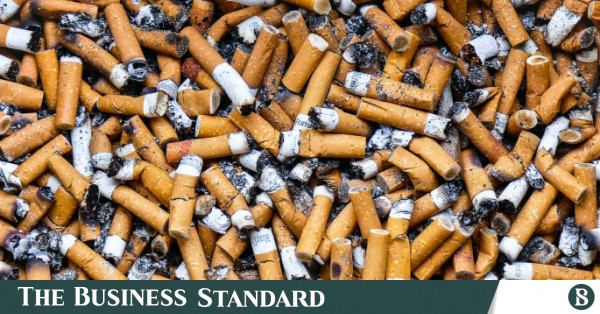With over 57,000 tobacco-related deaths a year and irreversible environmental destruction, British American Tobacco’s operations in Bangladesh persist largely unchallenged, shielded by profit-driven policymaking and government inaction
Millions of tons of toxic waste are released by the cigarette industry alone, contaminating our water supplies and depleting soil fertility. Photo: Courtesy
“>

Millions of tons of toxic waste are released by the cigarette industry alone, contaminating our water supplies and depleting soil fertility. Photo: Courtesy
British American Tobacco (BAT) is a topic of vexingly biased discussion in Bangladesh. On the surface, BAT seems to be a major force in the economy, bringing in large sums of money for the government through taxes. Beyond this exterior, however, the business works with frightening impunity, abusing public health, neglecting its environmental obligations, and using devious marketing techniques to target young people.
What aggravates me the most is the purposeful silence of the government. Despite lawmakers’ claims to support environmental sustainability and public health, their silence allows BAT to control legislation by lobbying, circumventing tobacco laws, and putting profit before lives. How long will Bangladesh persist in exchanging human lives for corporate profits?
Ignoring the devastating impact of tobacco
Bangladesh is among the biggest victims of tobacco use, which is, let’s face it, deadly. 1.2 million people in Bangladesh suffer from severe illnesses brought on by smoking, and tobacco-related disorders are directly responsible for more than 57,000 fatalities annually.
However, despite the existence of laws, their enforcement is remarkably inadequate.
Think about this: although smoking is prohibited in public areas, the penalties are hardly enforced. We mandate health warnings on cigarette packaging, yet businesses purposefully lessen their impact by using misleading branding. The government has a conflict of interest that compromises public welfare as it talks about reducing tobacco usage while profiting monetarily from BAT’s efforts.
How can this be justified? Why is public health overlooked while formulating policies? In actuality, tobacco’s economic dominance over the nation outweighs any moral considerations.
BAT’s environmental destruction
The government conveniently fails to hold BAT accountable despite the fact that the company has ruined our environment, in addition to its health crisis. Tobacco planting has caused Bangladesh to lose 6% of its forests, but what steps are being taken to restore these areas? Where are the fines for the environment?
Millions of tons of toxic waste are released by the cigarette industry alone, contaminating our water supplies and depleting soil fertility. The corporation prospers because resource exploitation is permitted without repercussions due to the lack of enforcement of environmental responsibility.
If any other industry inflicted this level of damage, activists would rage, laws would tighten, and penalties would be imposed. But BAT, with its financial leverage, operates unchecked. We cannot afford this leniency. Environmental degradation caused by tobacco is irreversible, and unless we wake up to the crisis, we risk losing entire ecosystems to a corporation that doesn’t care.
Government’s silence or complicity
Let’s be honest, it is not by chance that the government has not regulated BAT more strictly. It’s deliberately quiet, disguised as ignorance.
Officials provide BAT loopholes that keep cigarette prices absurdly low, guaranteeing great accessibility, rather than increasing tobacco taxes. Less than 1% of the national budget is devoted to tobacco control, rather than healthcare expenditures, and the tobacco industry’s financial gains continue to support inaction.
In the meantime, hospitals in Bangladesh are overcrowded with patients with diseases linked to tobacco use. The government permits BAT to make money off of the very illnesses it causes, despite the fact that our healthcare system is already underfunded.
What does this say about us? Have we become a nation that values corporate revenue over human life? Because that’s exactly what’s happening.
Youth targeting: A dangerous strategy
One of the most sinister realities of BAT’s operations in Bangladesh is its blatant marketing targeting young people.
Though direct advertising is banned, 30% of youth are exposed to indirect tobacco promotions, whether through event sponsorships, social media influencers, or packaging strategies designed to make smoking look aspirational.
The government claims to enforce regulations, but let’s be honest, the tobacco industry controls the conversation. Every loophole they exploit, every weak policy they capitalise on, is a deliberate, strategic move to ensure future generations remain addicted.
If we fail to protect our youth, we are complicit in their addiction.
The cost of inaction
The reality is painfully clear: BAT thrives not because it is too powerful to regulate but because we refuse to regulate it. The government’s failure to enforce strict tobacco control measures is a betrayal of public health and environmental sustainability.
For too long, we have been passive. We have allowed corporations like BAT to operate without consequence, prioritising their profits over the well-being of our citizens. It’s time we demand:
- Higher tobacco taxes to reduce accessibility.
- Stricter enforcement of smoking bans and youth advertising restrictions.
- Legal action against BAT’s environmental damage.
- More funding for healthcare and tobacco cessation programs.
Enough excuses, public health must come first.
Aside from being harmful to one’s health, tobacco is also an environmental disaster, a political failure, and an economic treachery. Before it’s too late, the government needs to realise how dangerous BAT’s unbridled influence is.
The true question, after all, is: How many more lives will we give up before taking action?
Sketch: TBS
“>

Sketch: TBS


